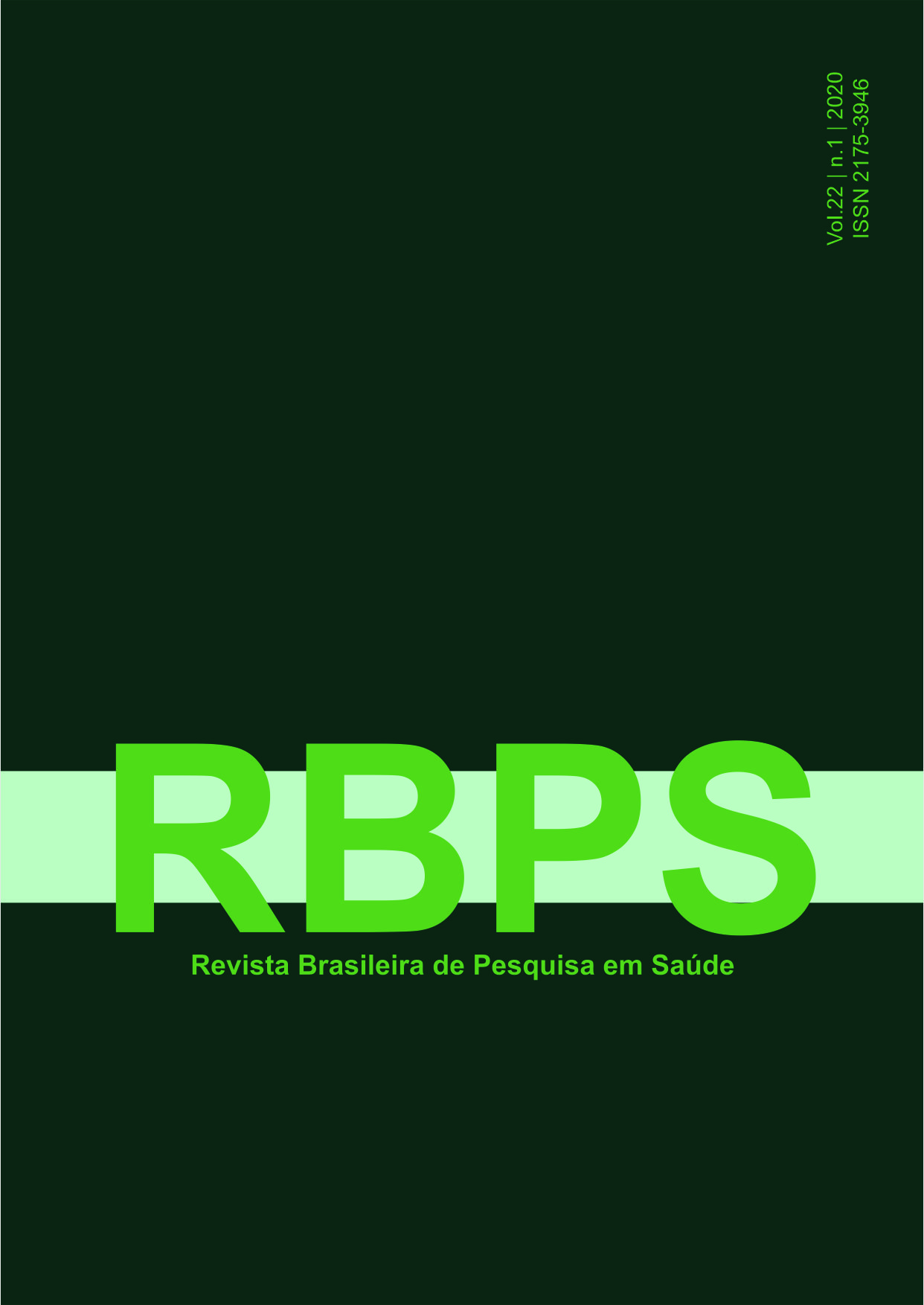Drug-related issues and pharmaceutical interventions in tuberculosis patients
DOI:
https://doi.org/10.21722/rbps.v22i1.19077Keywords:
Tuberculosis, Drug therapy, Pharmaceutical careAbstract
Introduction:
Tuberculosis (TB) is an infectious disease whose long-term pharmacological therapy contributes to treatment abandonment and to negative health outcomes. Pharmaceutical care has successfully improved treatment adherence and reduced the number of drug-related issues (DRI). Objective: Identifying DRI and tracing the profile of pharmaceutical interventions (PI) in tuberculosis patients treated in a hospital institution. Methods: Cross-sectional, prospective, interventional and quantitative study carried out from February to October 2017. Recommendations by the Brazilian Ministry of Health for the implementation of Pharmaceutical Clinical Services were used as method to identify and classify DRI and PI. Drug prescriptions and patients’ medical records were also used as data collection source. Results: Thirty-three individuals at mean age of 40.41 (± 13) years participated in the study. In total, 278 DRI were identified, the most frequent ones lied on issues involving drug selection and prescription (n = 215; 77.3%), as well as adverse reaction to drugs (n = 13, 4.7%). The total number of 296 PIs were performed, mainly information and counseling (n = 99; 33.5%) and drug interaction management (n = 80; 27%). Conclusion: DRI cases were common in the current study, as well as the need of PI. This outcome suggests that pharmaceutical clinical services have the potential to help multiprofessional health teams to identify and manage drug-related issues, as well as to help achieving better health outcomes in tuberculosis patients.
Downloads
References
1. Veronesi: Tratado de infectologia. 5. ed. São Paulo: Atheneu, 2015.
2. Magalhães JL, Antunes MAS, Boechat N. Identificação de expertise brasileira na luta contra algumas Doenças Tropicais Nigligenciadas. Revista da Sociedade Brasileira de Medicina Tropical, v. 45, n. 3, São Paulo, 2012.
3. World Health Organization. Global tuberculosis Report 2017. Geneva: World Healtha Organization; 2017. Disponível em: http://www.who.int/tb/publications/global_report/en/ Acesso em: 02 dez. 2017.
4. Brasil. Ministério da Saúde. Secretaria de Vigilância em Saúde. Programa nacional de controle da tuberculose. Brasília; 2004.
5. Organização Panamericana De La Salud. Servicios Farmacéuticos basados em laAtención Primaria de Salud:documento de posición de la OPS/OMS. Washington DC: PS, 2013. 106 p.
6. Brasil. Ministério da Saúde. Secretaria de Ciência, Tecnologia e Insumos Estratégicos. Departamento de Assistência Farmacêutica e Insumos Estratégicos. Serviços farmacêuticos na atenção básica à saúde. Cuidado farmacêutico na atenção básica. Caderno 1. Brasília, 2014.
7. Clark PM, Karagoz T, Apikoglu-Rabus S, Izzettin FV. Effect of pharmacist-led patient education on adherence to tuberculosis treatment. Am J Health-Syst Pharm, Vol 64, Mar 1, 2007.
8. Mitrzyk BM. Treatment of Extensively Drug-Resistant Tuberculosis and Role of the Pharmacist.PHARMACOTHERAPY. Vol. 28, Number 10, 2008.
9. Venkatapraveen A, Rampure MV, Patil N. Assessment of clinical pharmacist intervention to improve compliance and health care outcomes of tuberculosis patients. Der Pharmacia Lettre, 2012, 4 (3): p. 931-937. Disponível em:http://scholarsresearchlibrary.com/archive.html. Acesso em: 10 dez. 2017.
10. Tanvejsilp P, Pullenayegum E, Loeb M, Dushoff J, Xie F. Role of pharmaceutical care for self-administered pulmonary tuberculosis treatment in Thailand. J Clin Pharm Ther. 2017; p. 1-8. Disponível em: https://doi.org/10.1111/jcpt.12519. Acesso em: 10 dez. 2017.
11. Mkele G. The role of the pharmacist in TB management. S Afr Pharm J. 2010.
12. Lopes ARV, Miranda SS, Ceccato MGB, Silveira MR, Resende NH, Carvalho, WS. Evaluation of the impact of pharmaceutical care for tuberculosis patients in a Secondary Referral Outpatient Clinic, Minas Gerais, Brazil. Annals of the Brazilian Academy of Sciences. September 2017.
13. Carvalho RD, Souza AR, Souza WS, César H, Pacheco FJ, Sacrament M. Atenção farmacêutica em pacientes com tuberculose pulmonar. Infarma Ciências Farmacêuticas, v. 23, n. 3/4, 2011.
14. Silva DB et al. Assistência farmacêutica a pacientes com tuberculose pulmonar: uma revisão integrativa. Revista Presença, v. 2, n. 7, p. 83-106, apr. 2017.
15. Souza MFB, Oliveira EP. O estudante do curso de farmácia da anhanguera educacional na colaboração com o plano nacional de controle da tuberculose. Anuário da Produção Acadêmica Docente. Vol. 5, Nº. 12, Ano 2011.
16. Brasil, Ministério da Saúde. Secretaria de Ciência, Tecnologia e Insumos Estratégicos. Departamento de Assistência Farmacêutica e Insumos Estratégicos. Serviços farmacêuticos na atenção básica à saúde; 308 p.: il. Cuidado farmacêutico na atenção básica. Caderno 2; Brasília, 2014.
17. Whocc - ATC/DDD Index. Structure and principles, 2016. Disponível em: https://www.whocc.no/atc_ddd_index/. Acesso em: 10 dez. 2017.
18. Micromedex® 2.0. Truven Health Analytics. Disponível em: http://www-micromedexsolutions-com.ez51.periodicos.capes.gov.br/. Acessado em 02 dez. 2017.
19. Borges APS, Guidoni CM, Freitas O, Pereira LRL. Economic evaluation of outpatients with type 2 diabetes mellitus assisted by a pharmaceutical care service. Arq Bras Endocrinol Metab., 2011. p. 686-91.
20. Carter BL, Ardery G, Dawson JD, James PA, Bergus GR, Doucette WR et al. Physician and Pharmacist Collaboration to Improve Blood Pressure Control. Arch Intern Med. American Medical Association, 2009. p. 1996-2002.
21. Carnevale RC, Molino CGRC, Visacri MB, Mazzola PG, Moriel P. Cost analysis of pharmaceutical care provided to HIV-infected patients: an ambispective controlled study. DARU. 2015;23(13):1–9.
22. Moore JM, Shartle D, Faudskar L; et al. Impact of a Patient-Centered Pharmacy Program and Intervention in a High-Risk Group. J Manag Care Pharm, v. 19, n. 3, 2013. p. 228-36.
23. Ribeiro VF, Sapucaia KCG, Aragão LAO, Bispo ICS, Oliveira VF, Alves BL. Realização de intervenções farmacêuticas por meio de uma experiência em farmácia clínica. Ver. Bras. Farm. Hosp. Serv. Saúde, 2015. p. 18-22.
24. Aguilera TRK, Matos VTG, Ganassin AR, Toffoli-Kadri MC. Impact of pharmacy residents in pharmaceutical hospital care. Afr J Pharm Pharmacol, 2015. p. 26-32.
25. Matos ES, Limberger JBz. Assistência à saúde de pacientes com tuberculose no município de Santa Maria. RS. Infarma Ciências Farmacêuticas 26.2 (2014): 96-102.
26. Barros, PG et al. Perfil Epidemiológico dos casos de Tuberculose Extrapulmonar em um município do estado da Paraíba, 2001-2010. Cad. Saúde Colet., 2014, Rio de Janeiro.
27. Costa, RR. Et al Tuberculose: perfil epidemiológico em hospital referência no tratamento da doença. Minas Gerais: Rev Med, 2014. p. 24.
28.Brasil. Ministério da Saúde. Secretaria de Vigilância em Saúde. Departamento de Vigilância Epidemiológica. Manual de recomendações para o controle da tuberculose no Brasil. Brasília: Ministério da Saúde; 2011.
29. Costa SV, Ceolim MF. Fatores que interferem na qualidade do sono de pacientes internados. Revista da Escola de Enfermagem da USP, São Paulo, v. 47, n. 1, p. 46-52, feb. 2013. Disponível em: https://www.revistas.usp.br/reeusp/article/view/52851/56754. Acesso em: 02 feb. 2018.
30. Arbex MA, Varella MCL, Siqueira HR, Mello FA. Drogas antituberculose: Interações medicamentosas, efeitos adversos e utilizações em situações especiais. Parte 1: Fármacos de primeira linha*. Jornal Brasileira de Pneumologia. 2010. p. 626-640.
Downloads
Published
How to Cite
Issue
Section
License
Copyright (c) 2020 Revista Brasileira de Pesquisa em Saúde/Brazilian Journal of Health Research

This work is licensed under a Creative Commons Attribution-NonCommercial-NoDerivatives 4.0 International License.
Authors and reviewers must disclose any financial, professional, or personal conflicts of interest that could influence the results or interpretations of the work. This information will be treated confidentially and disclosed only as necessary to ensure transparency and impartiality in the publication process.
Copyright
RBPS adheres to the CC-BY-NC 4.0 license, meaning authors retain copyright of their work submitted to the journal.
- Originality Declaration: Authors must declare that their submission is original, has not been previously published, and is not under review elsewhere.
- Publication Rights: Upon submission, authors grant RBPS the exclusive right of first publication, subject to peer review.
- Additional Agreements: Authors may enter into non-exclusive agreements for the distribution of the RBPS-published version (e.g., in institutional repositories or as book chapters), provided the original authorship and publication by RBPS are acknowledged.
Authors are encouraged to share their work online (e.g., institutional repositories or personal websites) after initial publication in RBPS, with appropriate citation of authorship and original publication.
Under the CC-BY-NC 4.0 license, readers have the rights to:
- Share: Copy and redistribute the material in any medium or format.
- Adapt: Remix, transform, and build upon the material.
These rights cannot be revoked, provided the following terms are met:
- Attribution: Proper credit must be given, a link to the license provided, and any changes clearly indicated.
- Non-Commercial: The material cannot be used for commercial purposes.
- No Additional Restrictions: No legal or technological measures may be applied to restrict others from doing anything the license permits.

























